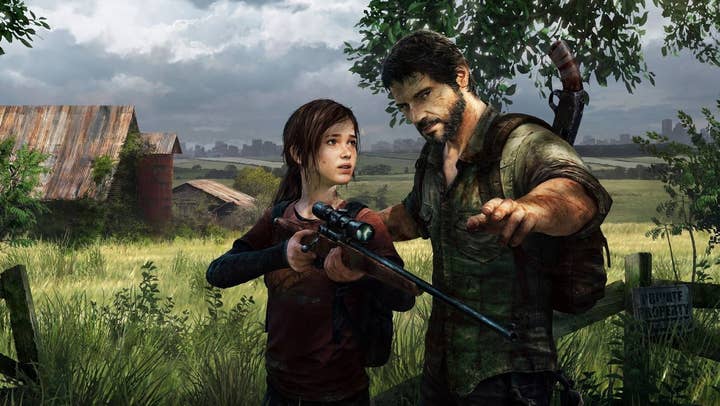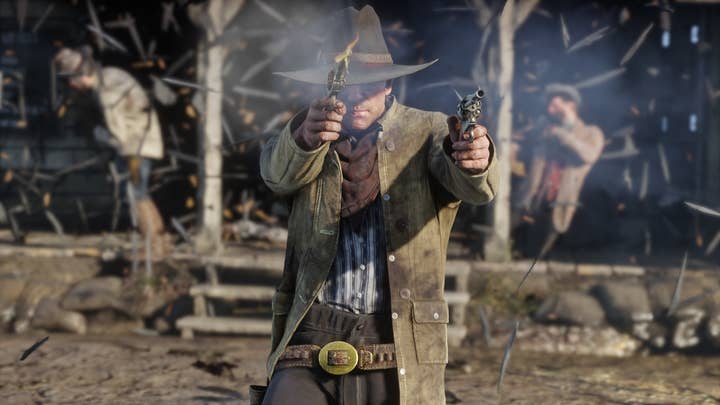Amy Hennig: AAA industry is at "an interesting crossroads" with storytelling
At Reboot Develop, the revered creator confessed to feeling "overwhelmed" by the scale of AAA games, which are now too big for their own stories
Consider every story-driven game that you've never completed; the cities left to ruin in the hands of a crazed villain, the hostages not rescued, the life-changing secrets undiscovered. Now consider how many of those were made by the industry's AAA publishers and developers, too bloated to be digestible.
This was the opening topic of a fascinating onstage interview with Amy Hennig at Reboot Develop Blue last week. After long stints at both Crystal Dynamics and Naughty Dog, Hennig was widely considered to be one of the industry's most important storytellers, and yet she confessed to feelings of alienation from the very games she so skillfully made.
"We're at an interesting crossroads in the industry, and I'm at a personal crossroads in terms of figuring out where I want to land next," Hennig said. "I feel that those two things are related a little bit."
"Across the board, we've doubled everything in size... and yet our price-point hasn't changed"
The period for which Hennig is best known is her ten years at Naughty Dog, which encompassed a trilogy of Uncharted games and The Last of Us. Both Uncharted: Drake's Fortune (2007) and The Last of Us (2013) were released on PlayStation 3, and Hennig marvelled at how much learning in terms of storytelling is evident when those games are viewed side-by-side now.
But something else is just as evident; a change less in Naughty Dog than in the sector of the games industry in which the studio operated. Uncharted: Drake's Fortune was a single-player game, Hennig said, with no multiplayer and just a handful of collectables. Most players could finish the whole thing in eight or nine hours.
"Compare that against Uncharted 4, which is double the size," she added. "The same thing for God of War versus God of War 2018, the same thing for Insomniac games from the mid-2000s versus Spider-Man. Across the board, we've doubled everything in size; we've also doubled our development time, and doubled our team sizes -- probably more than doubled in each of these cases -- and yet our price-point hasn't changed.
"Some of the pressures and the controversies that we see inside the industry are coming from that; the fact that the scope of what we're working on has increased to such a huge degree, but the price-point of our product hasn't."

That price-point -- not explicitly stated, but likely the $60 tag broadly associated with big-budget games -- has been in place since "the cartridge days," Hennig said, and she acknowledged that, "nobody wants that [price] to go up." Publishers have been just as reluctant to enforce a higher baseline price-point on consumers as the consumers themselves would have been to accept the need to pay more.
"If you made a finite game, it was perceived as a rental," Hennig said. "Online forums would say, y'know, 'Rent it, or buy it used, or buy it and sell it back.' Publishers' response was, 'How do we create value?' -- or even just the illusion of value, right? Where you see games with multiplayer tacked on, that was trying to create this illusion of value, where you didn't want to trade it in."
"A lot of where we're at now in terms of scope and complexity and cost is sort of self-inflicted"
The spread of games-as-a-service and monetisation tools like loot boxes are a direct result of this unresolvable tension; between satisfying consumer demand for bigger and more sophisticated games, and the difficulty of charging more upfront to recoup that extra investment. One of the casualties of this shift is the kind of game that a creator like Hennig really wants to make -- games like Uncharted: Drake's Fortune.
"A lot of where we're at now in terms of scope and complexity and cost is sort of self-inflicted," Hennig said. "We've changed from intentionally creating these finite experiences to creating experiences that just don't end.
"That's very hard for me as a storyteller. It's a very weird place to be, because story, for me, is by definition finite and intentionally authored. It's not something that just happens through a series of events that unspool procedurally... It has landmarks and a deliberate end.
"We're in a world where we're not even making finite games, and when we are they're 20, 40 or 100 hours, and the common wisdom is that most players don't finish them. We have these statistics inside the industry; some publishers, they realise that 10% of their audience is going to see the entire story. And that's upsetting."
Behaviour that would be damning toward the product in a medium like cinema -- walking away from a film halfway through -- is now absolutely commonplace with big-budget, story-driven games. Even as developers are becoming more and more skilled at telling stories -- as Naughty Dog did between the first Uncharted and The Last of Us, to use Hennig's own example -- market trends are pushing those games in a direction where the story itself will rarely be experienced in full.
"Publishers realise that 10% of their audience is going to see the entire story. And that's upsetting"
"This may seem like we're laying it at the players' feet, and I don't mean it that way at all," Hennig said. "What I'm saying is that, as a gamer, I'm so drawn to the games we're making now, but I know that we'll never get to the end of them. I won't have the time.
"We're sort of loathe to talk about this as long-time gamers, because it seems like when you talk about feeling a little distanced or disenfranchised from your hobby, it can seem like you're somehow losing your gamer cred. But privately, my entire group of gamer friends and colleagues, we all privately confess to each other that we're sort of overwhelmed.
"Sometimes this gets misinterpreted as a dogmatic call to arms, or a response like, 'We shouldn't be making these games' -- of course we should. I just think that what dismays me right now is that it doesn't feel like we're making the whole spectrum of games that we could be making -- at least not in mainstream, publishing and developing, AAA.
"Everything is just doubled down on mega blockbusters, which are way more massive in scope than they used to be... They are all Hail Mary bets now."

This appears to be the "crossroads" at which Hennig finds herself as a creator; one whose entire career has been spent making a kind of game that has often appeared to be on the brink of extinction over the last few years. Indeed, much of that debate was fuelled by EA's decision to close Visceral Games, where Hennig was deeply involved in a "story-based, linear adventure game" set in the Star Wars universe. At the time, EA cited the need to alter the project's course, "to deliver an experience that players will want to come back to and enjoy for a long time to come."
"My entire group of gamer friends and colleagues, we all privately confess to each other that we're sort of overwhelmed"
However, while this trend has made an apparent impact on her career trajectory, it is just as keenly felt by Hennig as a player. More and more, she said, it has been necessary to turn to indie games to find the "finite experiences" that satisfy her appetite for good stories, mentioning Annapurna Interactive as a particularly reliable publisher of those.
"I'm finding the greatest reward in playing games from that space, even though I'm absolutely dumbstruck with admiration at the big games that have been winning awards this year," she said. "God of War, and Spider-Man, and Red Dead [Redemption 2]; I'm full of admiration for them, but there's also this sense of regret that I know I'll never get to experience them fully.
"And then, as a creator, I think about how that would make me feel."
In that sense, Hennig argued, the industry's biggest publishers are increasingly out of step with major companies in other screen-based media. In television, platforms like Netflix have effectively removed the factors that once limited episodes to 25-minute and 45-minute lengths, and yet creators and consumers continue to embrace them -- "partly because that's what we're used to, but also because that's what's digestible."
"That's how Uncharted was structured. Each of those chapters was about the size -- and I don't think it was exactly the intention, it was more gut instinct as writers -- of about a half-hour of television, or about an hour of television... There was an opportunity for the player to go, 'Okay, that's good, more tomorrow.' Or go, 'One more, one more.'
"Nobody [in television] is creating something and going, 'Open wide, here's ten hours of television.' Because the viewer might go, 'I can't.' But in games we're saying, 'You gotta play Red Dead, it gets really good about 30 hours in.'
"You hear that and don't you just die inside? I don't have 30 hours."
GamesIndustry.biz is a media partner of Reboot Develop. We attended the event with assistance from the organiser.









